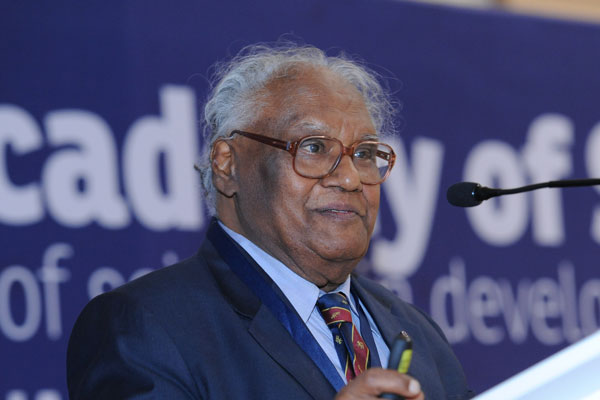Within the past two centuries or so, science has moved from Antoine-Laurent de Lavoisier's discovery that oxygen allows combustion, to the dissection of atoms at the nanoscale dimension and the possibility to use smart, innovative materials that change properties under specific conditions, even at extremely low temperatures. Who would have imagined knowledge could come so far, so fast?
 The story of chemistry is fascinating, and its appeal looms large if the narrator is a internationally influential chemist and a passionate science communicator such as C.N.R. Rao, a TWAS Founding Fellow and former TWAS President.
The story of chemistry is fascinating, and its appeal looms large if the narrator is a internationally influential chemist and a passionate science communicator such as C.N.R. Rao, a TWAS Founding Fellow and former TWAS President.
Rao was at the 27th TWAS's General Meeting in Kigali, Rwanda, where his special lecture on the opening day offered a passionate overview on major discoveries and the chemists who made them. This year, TWAS's General Meeting was hosted by the Government of Rwanda, with the support of Rwanda's Ministry of Education. Rwandan President Paul Kagame and Minister of Education Papias Musafiri Malimba, were in the opening ceremony.
Focusing on Innovation for Sustainability, the meeting offered a broad overview on Rwanda's mission to embrace science as a tool for development, and underlined how TWAS and Rwanda share similar goals and objectives.
Rao is an undisputed authority not only in chemistry but also beyond. He has been a professor in the most prestigious Universities worldwide: King's College, Cambridge, UK (1983-84), Universite Joseph Fourier, Grenoble, France (1990) and University of California, Berkeley (2008 - 2011), to name a few. He currently is Honorary President & Linus Pauling Research Professor at Jawaharlal Nehru Center for Advanced Scientific Research in Bangalore.
Rao has honorary doctorates from 60 universities from around the world, and is a Fellow of 30 scientific Academies. He has authored around 1,500 research papers and 45 scientific books.
His speech offered a thorough window on the fascinating and dynamic world of chemistry. French chemist Lavoisier (1743–1794), Rao recalled, can be rightly considered the father of chemistry: he established the law of conservation of mass and helped systematize chemical nomenclature. Since Lavoisier, through the 19th century, many others helped build this discipline. John Dalton studied the behaviour of gases, and Friedrich Kekulé discovered that carbon could make four bonds. Dmitri Mendeleyev is the father of the Periodic Table of elements that remains a cornerstone of chemistry today.
However, Rao explained, it was the dawn of the 20th century that witnessed a true blooming of discoveries and fundamental realisations that made it "the century of chemistry". Many of the most brilliant minds, such as Emil Fisher, William Ramsay and Alfred Werner, to name a few, were awarded the Nobel Prize.
It is worth mentioning the efforts and results that Marie Curie Sklodowska – a woman in a male world – obtained by discovering two radioactive elements, polonium and radium, thus offering new perspectives on the way scientists used to study matter and energy. Marie Curie, Rao recalled, received the Nobel Prize twice – in 1903 for physics and in 1911 for chemistry.
As he moved from Einstein to the first molecular studies that helped elucidate the proteins's structure carried out by Linus Pauling, the passion seemed to build in Rao's narration.
Perhaps this is no surprise. Pauling died in 1994, which means that Rao was his contemporary. Indeed, during the last five decades or so, Rao's own research and scholarship can be considered as milestones in chemistry. His international reputation is based on a plethora of results obtained in parallel fields, all of them leading to breakthrough discoveries and paradigm-shifts.
He has made significant contributions to emerging fields such as solid-state chemistry, where he developed innovative research on metal oxides, nanomaterials and graphene. He has also made innovative use of cutting-edge technologies such as spectroscopy and electron microscopy.
Rao has conducted studies on unique electronic properties and inorganic layered structures that have been published by prestigious scientific journals such as Nature. And in recent times he has also addressed fields that can be considered a frontier in chemistry. He studied fullerenes, carbon molecules arranged in the form of a hollow sphere, and nanotubes, nanometer-scale tube-like structures. One nanometer is one billionth of a meter).
"Chemistry is everywhere: whether we try to use solar energy to produce renewable energy, or we study batteries or new materials for our mobile phones," he said. "Even if we stand on the shoulders of giants, we still have much to explore ahead."
Rao has been awarded the Bharat Ratna, India’s highest civilian award, which is bestowed upon recommendation by the Prime Minister of India. The prize acknowledges “performances of the highest order in any field of human endeavour”. He received the award on 4 February 2014 from President Pranab Mukherjee during a ceremony in the Durbar Hall of the Rashtrapati Bhavan. He also served as the chairman of the science advisory council to the Prime Minister of India from 2004 to 2014, and is the Founder President of the Chemical Research Society of India, and the Materials Research Society of India.
Within TWAS, Rao is the namesake and sponsor of the C.N.R. Rao Prize that acknowledges distinguished scientists from the world's scientifically lagging and Least Developed Countries who have made significant contributions to global science. The prize was established in 2006.
Cristina Serra

